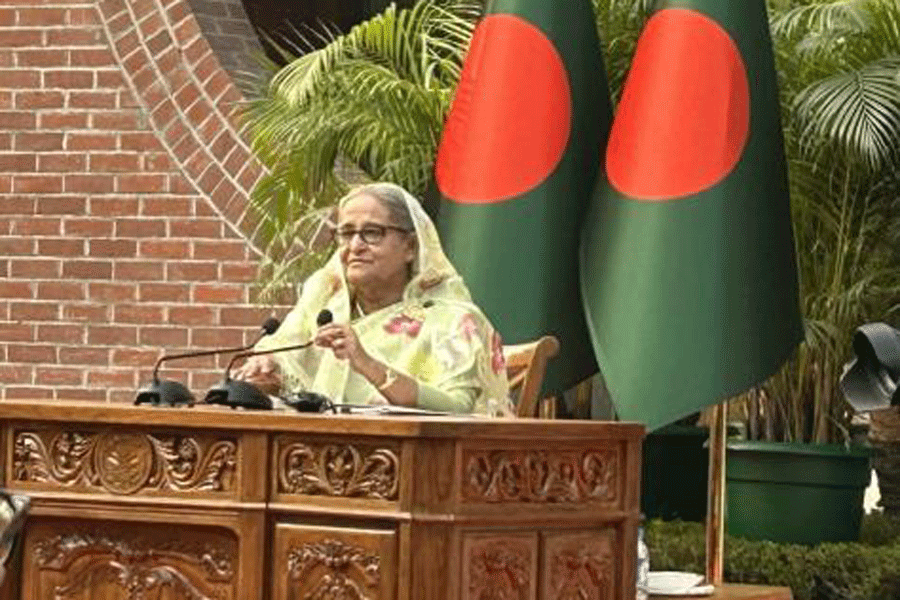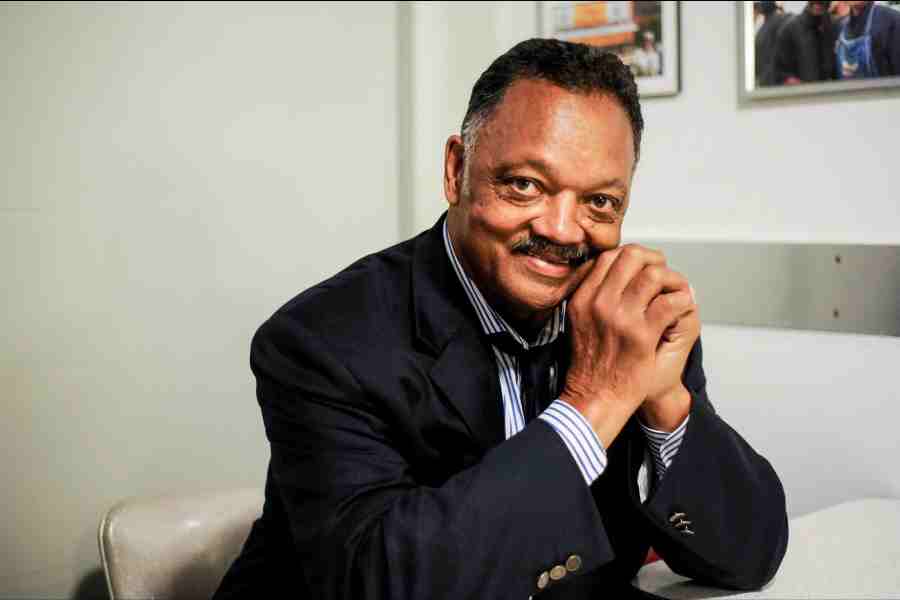Awami League president Sheikh Hasina on Monday said that the twelfth general elections in the country had set an example of free, fair and impartial polls. Her comment was aimed at countering probable questions on the credibility of the mandate in the absence of any major Opposition force in Sunday’s polls.
“We have managed to create a precedent that elections can be held in a free, fair and peaceful manner…. This victory belongs to the people of this country as they came out, voted and established their rights to vote,” said Hasina in her first interaction with the media after the polls in which her party bagged 222 seats, around 74 per cent of the seats.
According to the final results announced by the poll panel, the tally stood at 62 for Independent candidates, 11 for the Jatiya Party and one each for the Bangladesh Workers’ Party, Jatiya Samajtantrik Dal and Bangladesh Kalyan Party. Polls were not held in one seat because of the death of one of the contestants while the outcome in one of the seats was not announced after the election commission cancelled the candidacy of one of the main contenders there.
With this sweeping mandate, Hasina’s appointment as the Prime Minister of the country for the fifth time — fourth time in a row — is just a formality after the MPs are sworn in and she becomes the leader of the House.
As almost all the victorious Independents are originally from the Awami League stable and the winners from other parties made it to Parliament because of direct or indirect support from the ruling party, the BNP leadership demanded the cancellation of Sunday’s “dummy election”. The BNP had boycotted the polls as their demand for a poll-time caretaker government was not met.
“Sheikh Hasina must resign and the dummy election of January 7 must be cancelled,” said BNP standing committee member Moyeen Khan, questioning the credibility of the polls.
The BNP establishment — accused by the ruling Awami League of attempts to defame the election by causing arson activities ahead of the polls and preventing people from going to the booths on polling day — also questioned the final turnout figure of 41.8 per cent that the poll panel shared on Tuesday after collating data from across the country. A section of the anti-government civil society also joined the chorus, decrying the polls and questioning turnout figures.
These discordant voices, however, got drowned in the barrage of congratulatory messages that Hasina received from envoys of several countries like India, China, Russia, Singapore and Sri Lanka as they rushed to Ganobhaban, Hasina’s official residence, to wish her on behalf of their governments. The Indian high commissioner to Bangladesh, Pranay Verma, was the first foreign envoy to greet her on behalf of Prime Minister Narendra Modi, who himself congratulated Hasina later with a message in his official X handle.
The Bangladeshi media reported that several international observers, some from the US, the UK and Canada, hailed the polls.
The endorsement made the Awami League establishment happy. The veracity of some of these validations, however, came under question after the Canadian High Commission tweeted that “any individual who identifies as a Canadian observer is acting independently”.
Though Hasina had categorically said on Sunday that she did not care for any such validations as her primary concern was the people of Bangladesh, it remains to be seen how the US-led bloc — which is sympathetic towards the BNP and its demands — officially reacts to the election.
Probably aware that questions on the absence of the Opposition parties cannot be swept under the carpet in a hurry as the BNP gave a call for continued protests against the polls, Hasina — who took care to explain Awami League’s commitment to democracy — put the blame on the Opposition for staying away from the polls.
“If they do not take part, what can we do?” Hasina shot back when a question on whether Bangladesh has a vibrant democracy was directed at her.
She also asked whether the BNP — referring to the party’s tradition of creating arsons and killing people in the name of protests — can be called a democratic party.
Earlier, during her opening remarks at the start of a meeting with mediapersons and international observers, she spoke at length about the country’s chequered history, replete with examples of coups, counter-coups and failed coups, army dictators who gave up their battle fatigues later and floated political parties.
“The parties that were born in the hands of military dictators can’t move on their own. They don’t have public support. So, they fear the direct election,” she said in a veiled attack on the BNP that was born under military ruler Zia-ur Rahman and is currently led by his wife, Khaleda Zia, who has been ailing for some time, and son Tareq Rahman who has been living in London for over 15 years.
While the army remains powerful in the Bangladeshi scheme of things even today, there is no doubt that Hasina must be credited for keeping the men in uniform confined to their barracks since 2008 when she returned to power with a huge mandate after two years of uncertainty under an army-backed civilian regime. The governments under Hasina also have the distinction of holding elections every five years, though all the last three had been shrouded in controversies.
“This is my eighth election as I have been contesting since 2008... I have never seen such keen interest in an election in Bangladesh,” she said, before adding that the international scanner would strengthen the democratic structure in Bangladesh.
Responding to a question from this correspondent on the state of democracy in the absence of an Opposition — the last two parliaments were also bereft of any major Opposition force — she replied: “What do you want? Should I constitute an Opposition party?”
Then she gave a brief account of how she cut her teeth as an Opposition leader before coming to power for the first time in 1996.
“The Opposition has to organise themselves... If they fail to do that, who is responsible?” asked Hasina, reiterating the BNP’s failure.
As Khaleda has been out of action because of illness and after being incarcerated on corruption-related cases and her son Tareq, who tries to run the party through online meetings, the narrative spun by Hasina has been gaining ground even among the staunch anti-Awami League sections of society as an answer to the question: Why does an Opposition elude Bangladesh.
“Our Prime Minister has also said in private several times that she also wants a proactive and democratic Opposition... The BNP can never fit the bill because of its dubious past and the structure of leadership,” said a ruling party insider, referring to the absence of a credible Opposition as one of the biggest challenges facing Bangladesh.
The Muslim-majority country of over 170 million has a slew of other problems like overdependence on remittances and readymade garments exports for forex earnings, high unemployment among youths, climate-related vulnerability and a rise in Islamic fundamentalism.
“We want to be a developed country by 2041… Smart government, smart economy and smart people, that’s our target,” summed up Hasina.










